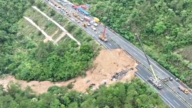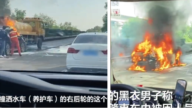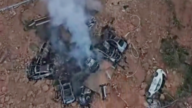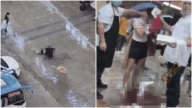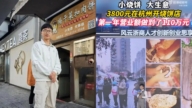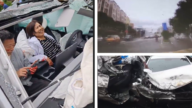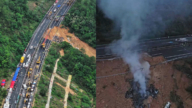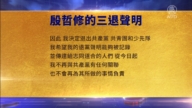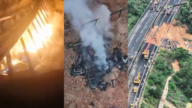【新唐人2014年12月10日讯】近来,中共中宣部、新闻单位和网络监管部门联合发表声明表示,要对大陆媒体采取进一步管制措施,要各级各类新闻单位对驻地方机构进行全面清理整顿,撤销不符合要求的驻地记者站、解雇违规聘用人员。媒体观察人士指出,新闻界腐败问题的确严重,但根源不在记者本身,当局的做法表面“清理”媒体腐败,实则借机加强管控。
据中共《新华网》报导,中宣部、国家新闻出版广电总局、国家网信办召开专题会议,详细部署了针对各新闻单位驻地方机构的“清理整顿”工作。
会议指出,近年来一些新闻单位驻地方机构过多过滥、人员私聘滥聘、违法违规行为多发频发等问题,日益凸显,严重败坏新闻界风气、侵蚀新闻媒体权威性公信力,社会影响恶劣。
会议要求,对各级各类新闻单位驻地方机构设立、人员使用、业务开展情况进行全面清理,不符合要求的驻地机构一律撤销合并,违规聘用人员一律辞退。
对此,很多媒体人士表示,中国新闻界腐败十分严重,记者搞有偿新闻、敲诈勒索的现象的确极为普遍。
前北京大学新闻学院副教授焦国标:“国内的新闻记者站非常的混乱,好多的记者在下边就吃、拿、抢、要。在地方敲诈勒索是非常大的问题。他们做记者有的是为单位‘创收’,有的是借着这个名义为自己‘创收’,实际上所谓‘创收’是什么?就是敲诈勒索。”
媒体人士还透露,一些媒体单位向企业强行索取“好处费”,若不从就进行大肆抨击和“负面报导”,若是红包给的够足,就会给予“正面宣传”和极尽所能的“赞扬”。但媒体人士同样指出,上述腐败现象的存在,问题不在记者本身,而是整个媒体行业的道德观已不复存在。
《德国之声》援引中国资深媒体人、前《冰点周刊》主编李大同的观点表示,中国媒体腐败根源在于,中共对新闻的严格管控,使新闻工作者没法从事真正的采访报导工作,因此很容易陷入“歪门邪道”。
焦国标:“媒体本身的大的格局有问题、新闻界的体制有问题。各地、各层级的媒体又不能够完全独立经营,不能在新闻业本身的职业化上去竞争。它没有办法,因为大环境不允许,它们又得生存,那怎么办呢?就来这些歪门邪道,搞些地方记者站,搞些乱七八糟的记者,去敲诈勒索。”
就此,李大同指出,即使中共当局采取目前这种“全面清理”的办法,效果也很有限,因为“野火烧不尽,春风吹又生”。
宪政学者陈永苗:“我只能说这措施本身来说是个治标不治本的行为,它只要有新闻的管控,它就必然产生新闻腐败,这是一个没办法的事儿。我觉得它对各种新闻领域的管控,它都是以一种以毒攻毒的方式,最后发现旧的毒没去,然后又增加了新的毒,我觉得这是一个没用的办法。”
此外,除了针对各地记者站,专题会议还强调,要将各媒体网站的地方频道纳入清理范围。中央重点新闻网站开设地方频道必须经过事前审批,其他各类网站不得开办地方频道和驻地方机构从事新闻采编业务,已开办的一律撤销。
外界认为,这一政策很明显是将言论控制,由传统媒体扩大到了新媒体。
中国知名的新媒体推动者温云超则指出,无论是针对传统的记者站或者是新媒体,中共当局出台的所有新闻管理政策,基本上都不是为了新闻的专业性和规范性,而是为了进一步加强控制。
采访/陈汉 编辑/张天宇 后制/钟元
The CCP’s Clean Up: Correspondents Stands Accused Of Controlling Regulations
Recently, a joint statement was issued by the Propaganda
Department of the Central Committee of Chinese
Communist Party (CCP), News Agencies and the Internet
Supervision Departments.
Further control measures in the Mainland media require
all levels of news organizations to conduct a comprehensive
clean-up and rectification of local branch offices, cancel
all those correspondent stations which do not comply
with the requirements and dismiss illegally-employed staff.
Media observers have pointed out that serious corruption
exists in the field of news media.
However, the root cause is not reporters; the authorities
labelled the action as cleaning-up corruption
in the media field, but in fact took the opportunity
to strengthen supervision and control over the field.
According to the CCP’s Xinhua Network, the Propaganda
Department of the Central Committee of the CCP,
the State Administration of Press, Publication, Radio,
Film and Television (SAPPRFT), and the State Internet
Information Office jointly held a special meeting requiring
each news agency to deploy “the clean-up and rectification"
of local offices.
The meeting noted that in recent years frequent problems
occurred with a number of news organizations who had
an excessive number of local agencies that privately hired
staff and conducted other illegal activities.
This became increasingly prominent, seriously damaging
the media atmosphere, eroding media credibility.
All of these produce bad social impacts.
The meeting required various types of news organizations
at all levels to carry out a comprehensive clean-up
on their local institutions, personnel
and business operations.
Those disqualified local offices are required to close
or merge, all illegal employment of staff shall be dismissed.
In this regard, many media sources said that corruption
in Chinese media was very serious, and the phenomena
of engaging in paid news reports and extortion
were indeed very common.
Jiao Guobiao, former associate professor of journalism,
Peking University: “Domestic news reporter stations
are very chaotic.
When many reporters visited the news targets,
they ate, took, looted, and extorted.
Their looting and extortion at their local offices
has become a very big problem.
Some reporterss are working to “bring income"
to their companies, some just utilize these opportunities
to create more personal income sources.
In fact what is the so-called creating more income?
This is called looting and extortion.”
Media sources also revealed that some media outlets
forced some enterprises to offer commissions,
otherwise they would denounce the enterprises
and report negative news about the enterprises.
If they were gifted generously, then they would give
positive publicity and praise.
But the media professionals have also pointed
to the existence of corruption.
The problem is not aimed at reporters, and the morality
of the entire media industry has ceased to exist.
Deutsche Welle quoted Mr. Li Datong, a senior Chinese
media professional and former editor of Freezing Point
Weekly who said that the root of corruption of Chinese
media is the CCP’s strict control of the news.
It causes journalists to be unable to work on the real
interview reports.
Therefore it is easy to fall into “dishonest or crooked" ways.
Jiao Guobiao: “The overall media pattern and media
institutional system are problematic.
The media at all levels are not able to completely execute
independent operations.
They cannot compete in professional journalism itself.
They have no way, because the environment
does not allow them to.
But they also have to survive, so how?
Then they developed these dishonest or crooked ways.
They establish correspondent stations, recruit
poor-quality reporters, and then go extort."
In this regard, Li Datong pointed out that even if the Chinese
authorities take the current “comprehensive clean-up"
approach, the effectiveness is very limited because
new problems will crop up.
Constitutional scholar Chen Yongmiao: “I can only say that
this measure in itself is a palliative action that does not cure
the root reason.
As long as the news is supervised and controlled,
this will inevitably produce news related corruption,
and there is no choice in the matter.
I think its regulating all sorts of media is to create a theft
in order to catch a thief, then finally finding out the old
poison did not work, and then added a new drug.
I think this is useless.”
In addition to the correspondent station in many places,
the conferences also stressed that all the local channels
of all media across all media websites shall be included
in the clean-up and rectification.
The key news website must be approved for setting up
local channels.
All other websites are not allowed to open local channels
or undertake the interviewing and editing business
of the local office of the news agencies.
All opened local channels and local correspondent
stations will all be removed.
Public opinion believes that this policy obviously applies
control of speech from the traditional media to new media.
China’s leading promoter of new media, Mr. Wen Yunchao,
pointed out that all news management policies issued by
Chinese authorities, whether to a traditional correspondent
station or new media reporter stations, are for further
enhancing control rather than developing professionalism.


